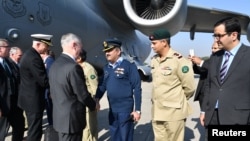The U.S. Embassy in Islamabad is denying Pakistan’s claims it has suspended military or intelligence cooperation with the United States.
Embassy spokesman Richard Snelsire said, “We have not received any formal communication regarding a suspension.”
Earlier Tuesday, in a speech to the Islamabad-based, government sponsored Institute for Strategic Studies, Pakistan’s Defense Minister, Khurram Dastgir Khan, said there is "... a wide field of intelligence cooperation and defense cooperation, which we have suspended." But he added, the supply lines for NATO troops in Afghanistan, formally known as the Ground Lines of Communication or the Air Lines of Communication were still open.
Pakistan’s claim came after Washington’s decision to suspend security assistance to Islamabad.
In Washington, State Department’s Under Secretary for Public Diplomacy and Public Affairs Steve Goldstein told VOA Tuesday the United States is “hopeful that Pakistan will come back to the table” and assist in U.S. efforts to combat terrorism.
The U.S. announced last Thursday that it would not deliver military equipment or transfer security-related funds to Pakistan, suspending the so-called Foreign Military Financing (FMF) and Coalition Support Funds (CSF) but not civilian assistance to that country.
Monday, a Pentagon spokesman said the United States had conveyed to Pakistan “concrete steps” to take before the United States would resume hundreds of millions of dollars in aid, which was suspended after U.S. President Donald Trump indicated Pakistan had lied and deceived the United States while providing safe havens to terrorists fighting in Afghanistan.
Pakistan says the United States is scapegoating it for U.S. failures in Afghanistan.
A senior State Department official said earlier “the success in Afghanistan relies on better” relations between Afghanistan and Pakistan, and “it relies on Pakistan being an active, constructive player” in South Asia.
Pakistan says the United States is scapegoating it for U.S. failures in Afghanistan.
In his address, Khan also reminded the United States it needs Pakistan in its fight against terrorism in Afghanistan. “A reminder is in order. Logistics trump strategy,” he said.
Pakistan blocked the Lines of Communication for months after a 2011 attack by the NATO air force accidentally hit two Pakistani check posts, killing more than two dozen Pakistani soldiers.
Pakistan is considered the safest and cheapest route to resupply NATO troops. Other possible routes that go through Central Asian countries are more expensive and pass through a region Russia considers its backyard. Tensions between the United States and Russia have been high since Russia was accused of meddling in the latest U.S. presidential elections.
“We always look at that,” said Goldstein when asked if Washington is assessing alternative routes should Pakistan blocks supply routes to Afghanistan, while adding the U.S. is suspending but not cutting off permanently security aid to Pakistan.
But statements from senior U.S. officials indicate that despite these limitations, the administration is serious in its stance that Pakistan needs to change its behavior.
In a Sunday interview with CBS’s Face the Nation, CIA Director Mike Pompeo said, “The president has made very clear that he needs Pakistan to cease being a safe haven for terrorists that threaten the United States of America. End. Period. Full stop.”
Khan said his country wants to keep engagement with the United States open and would use its leverage after the utmost care and deliberation.










